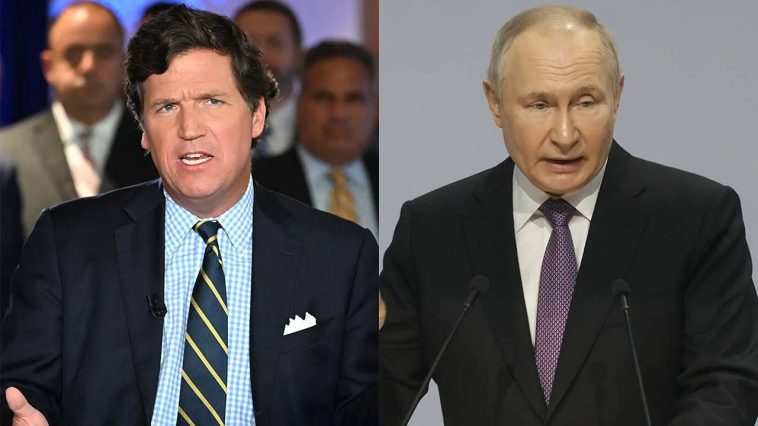LISTEN HERE:
Tucker Carlson, a leading voice of conservative commentary, recently made known his presence in Moscow, Russia, with an agenda to interview the Russian President, Vladimir Putin, the man behind the abrupt incursion into Ukraine commencing in 2022. The European Union has reportedly reacted to Carlson’s endeavor by considering appropriate actions, including sanctions and possibly even a travel ban. EU Parliament member, Guy Verhofstadt, voiced to Newsweek that due to Carlson’s perceived alignment with the perspectives of the 45th U.S. President Donald Trump and President Putin, such measures could be deemed necessary.
During a briefing earlier this week, Carlson shed light on the reasons compelling him to conduct the interview with Putin. ‘Our primary role is to keep our audience informed, a stance that we reinforce in our day-to-day journalistic activities’, Carlson stated. ‘We find ourselves deeply immersed in a conflict that has far-reaching implications, yet the majority of Americans remain uninformed. The discussions surrounding this region, whether it’s here in Russia or the ongoing tensions in Ukraine about 600 miles away, are of paramount importance to them, even though they might not yet fully grasp the extent.’
Carlson proceeded to analyze the aftershocks resulting from the Ukrainian war, referencing the catastrophic depopulation in Ukraine, Europe’s most expansive country. Amid the ongoing conflict, hundreds of thousands of Ukrainian men have tragically lost their lives. He emphasized, however, that this was not the only cost of the war but rather a starting point in understanding the profound global implications of this war.
The conservative commentator explained, ‘The changes imposed by this war are not confined to the theatres of battle but have extended their influence upon global military and trade stratagems. Not to mention, the ripple effects of sanctions imposed in response to the war. Collectively, these actions have brought about unprecedented disruptions to the world’s economies.’
‘Audiences in English-speaking nations seem largely uninformed and under the impression that the status quo remains untouched. Such presuppositions are largely due to the suppressed truth and the media organizations standing accused of censoring the truth, not overtly, but through an absence of important context and information.’ Carlson said.
Amplifying the real side of the Ukrainian war to mainstream America through his interview formed the primary objective for Carlson, despite contrary views. Luis Garicano, a former MEP, also voiced his perspective to Newsweek, painting Carlson in a rather unfavorable light. ‘He has made a transition from a journalist to a propagandist, serving the interests of one of the most condemned regimes in Europe, which poses significant threats to peace and security,’ said Garicano.
In light of the potential sanctions, Elon Musk, the CEO of a prominent tech company, expressed his concerns. ‘Disconcerting would be an understatement were these sanctions implemented. Carlson, regardless of one’s personal alignment with his views, remains a crucial figure in American journalism. Implementation of such an action could stir considerable unrest within the American public,’ Musk wrote.
The forthcoming release of Carlson’s interview with Putin is eagerly awaited by many, promising insights on the unfolding situation in Ukraine. It’s expected to be broadcasted across platforms such as X/Twitter and The Tucker Carlson Network, the commentator’s media portal.
The general public avidly awaits Carlson’s interview for its promise of raw, unfiltered information from one of the key players in the Ukraine conflict. While the commentary may be polarizing, it provides a perspective that is often unheard in mainstream discourse.
Regardless of personal alignment with or against Carlson’s views, many see value in the substantial voice he represents in the arena of American journalism. His up-front approach to address global conflicts and ask hard questions to influential leaders provides a refreshing perspective for his viewers.
Despite the potential action against Carlson by the European Union, the core belief in the freedom of speech and the role of journalism in a democratic society fuels his commitment to bringing the truth to the fore – no matter how uneasy it might be.
Carlson’s continual push for transparency, despite facing a potential backlash, underscores the importance of press freedom. Being in the ground zero of a cardiac conflict such as this could potentially unveil realities often glossed over in conventional reports, thereby, enriching public discourse around the issue.
While Carlson’s motives can be questioned by some, his attempts to unmask the truths of one of the most impactful global incidences in recent years seem to have resonated with a sizable segment of the American population. Their longing for untainted, fact-based reporting seems to be validated by such initiatives.
As the world readies itself for the official release of the Tucker-Putin interview, it serves as a reminder of the complex dynamics at play in our globalized world, and the role of journalism in not just reporting facts, but probing deeper, challenging narratives, and bringing voices into the conversation that otherwise might be left unheard.
More Articles: Real News Now


